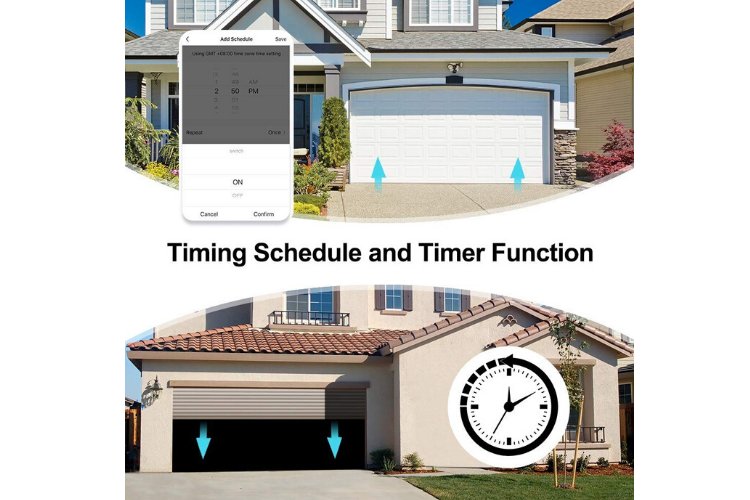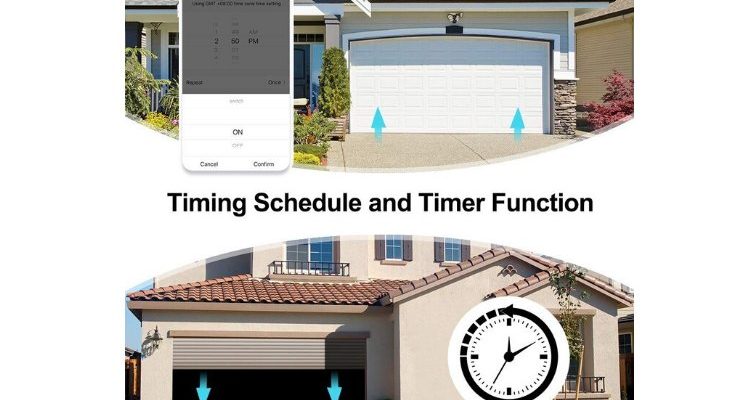
So, how does a timer work in the context of a garage door opener? Think of it as a helpful assistant that ensures your door won’t be left open longer than it needs to be. Most modern garage door openers, like those from brands such as LiftMaster or Chamberlain, offer this feature either built-in or as an add-on. This article will walk you through what this feature can do for you—giving you the lowdown so you can decide if a timer is right for your setup.
What is a Timer Garage Door Opener?
A garage door opener with a timer allows you to set a delay for your door to close automatically. It’s like having a clock on your wall that doesn’t just tell time but helps you manage your time, too. Instead of worrying about whether you left the door open too long, you can trust the timer to handle it.
For example, with a timer feature, you can program your garage door to close five minutes after you’ve opened it. This is particularly useful if you’re unloading groceries or have kids playing outside. It adds a layer of convenience that can ease a busy day. Without it, you might find yourself getting distracted and forgetting to close the garage door after a few minutes.
Why Should You Consider a Timer Feature?
You might think, “Why spend extra on a timer when I can just close the door manually?” But here’s the thing: convenience and security go hand in hand. A timer can enhance both aspects of your garage experience. Leaving your garage door open can be an invitation for crime, allowing burglars a way in. A timer helps you mitigate this risk simply and effectively.
Additionally, if you often forget to close your garage door, a timer can act as a safeguard against accidents. Sometimes life gets busy—kids might leave toys lying around, or you might be distracted with other tasks. With a timer, you can focus on what matters, knowing the door will take care of itself.
Are There Drawbacks to a Timer Garage Door Opener?
While there are plenty of upside to owning a garage door opener with a timer, there are also a couple of drawbacks to consider. For starters, not all models come with this feature. Depending on what brand you choose, a timer might only be available on higher-end models. So, if you’re trying to stick to a budget, this could raise your final price.
In some cases, a timer can run into troubleshooting issues. If your garage door opener fails to sync or reset, it may not close as intended. And let’s face it—no one wants to discover that their garage door has remained open all night because the timer malfunctioned. Always check the warranty and support options available to you when purchasing.
Programming and Using a Timer Garage Door Opener
Using a garage door opener with a timer is relatively straightforward. The process usually involves programming the remote control or adjusting settings on your device. Here’s a simple step-by-step guide to get you started:
- Locate the programming button on your garage door opener.
- Press and hold it until the indicator light blinks.
- Choose your desired time delay (usually between 1 and 10 minutes).
- Test the setting by opening the door and ensuring it shuts after the programmed period.
Once you’ve set it, you’ll most likely want to test your timer to ensure everything is working perfectly. This is an important step—you don’t want to leave your garage door open all night because the timer was incorrectly set!
Alternatives to a Timer Garage Door Opener
If you’re considering your options but are still on the fence about a timer garage door opener, there are a few alternatives worth exploring:
1. Smart Garage Door Openers: These come with built-in apps that let you control your garage door from your smartphone. Many have features that allow you to check whether the door is open or closed, giving you peace of mind if you forget to close it.
2. Manual Remotes: If you’re not interested in timers or smart features, traditional manual remotes work just fine. You’ll have to pay more attention to closing the door yourself, but some people prefer this straightforward approach.
Ultimately, choosing a timer garage door opener comes down to how much convenience you want and how important security is to you.
Final Thoughts: Is a Timer Right for You?
Deciding whether you need a garage door opener with a timer boils down to your lifestyle and preferences. If you value convenience and security, it might be worth the investment. A timer can simplify your life by automating the closing process, allowing you to be more attentive to what you’re doing—like enjoying a peaceful moment without worrying about whether the garage door has been shut.
On the other hand, if you’re someone who prefers to handle everything manually and doesn’t mind a little extra effort, you might feel satisfied without the timer feature. Either way, it pays to weigh the pros and cons, considering what fits best into your daily routine.
In the end, whether you go for a timer-equipped model or stick with a classic opener, just remember that a secure home starts with the small details. Happy garage door shopping!
